Laojun Mountain located to the west of Lijiang is called by historians as the ‘Ancestor of All Mountains in Yunnan Province’. Being a little-known core reserve of World Natural Heritage, it has not been overdeveloped and remains perfectly pristine. Here you can not only see the charming landscape like the Danxia landform, rich alpine plants, and numerous glacial erosion lakes, but also go deep into the local Lisu ethnic villages and families to learn about their migration history and colorful folk customs. While, there are few visitors and only some photographers and outdoor enthusiasts know it, thus a great place for hiking, mountaineering, and rock climbing.
This is the best Danxia landform in southwest China, which is the largest discovered at the highest altitude in China. Every peak in the scenic area is red in color, among which the most famous is the Qiangui Mountain (Thousand Turtles Mountain). The dry and cracked surface of the red sandstone appears bumpy under the weathering and erosion, as if a group of turtles slowly climbing up the hillside. To protect the geological wonder of Qiangui Mountain, tourists must be barefoot when climbing it.
There are many ethnic minorities in the scenic area, such as Naxi, Bai, Lisu, Pumi, and Yi. When you go hiking in the mountain, you can feel the colorful folk culture. Exploring deep into the ancient villages of Lisu people, you’ll find that their houses are made of timber and every house has an ever-burning fire pit for cooking, warming, and worship.
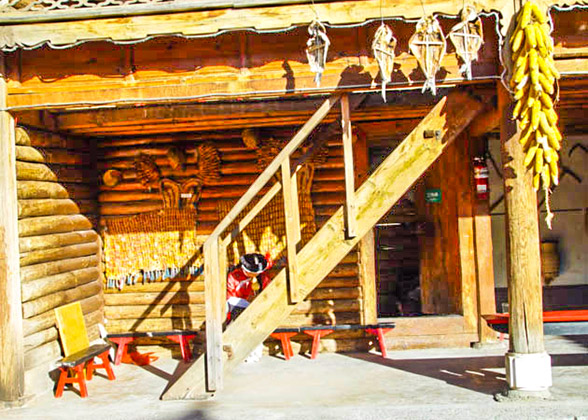 | | Lisu Ethnic Village House | | 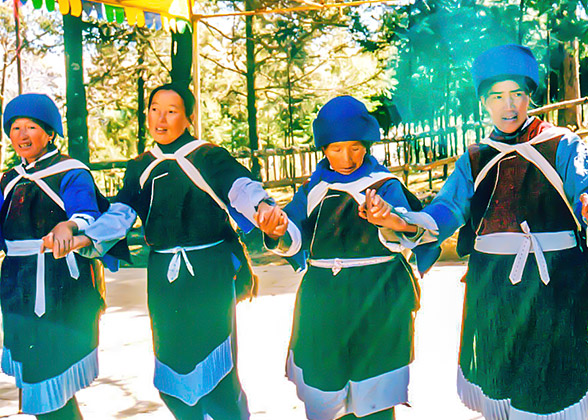 | | Lisu People in Traditional Clothes | |
3. Rare Plants and Animals
Laojun Mountain has a good ecosystem. The average altitude of the scenic area is between 3,000 and 4,000 meters (9,843 and 13,123 feet). When you hike up along the stream, you can see more kinds of flowers with the rise of the altitude, including some rare species like the giant tree azaleas and rhododendron bushes. May to June is the best season to see the blooming azaleas in Laojun Mountain. Besides plants, you can find some first-class national protected animals like Yunnan golden monkeys and red pandas.
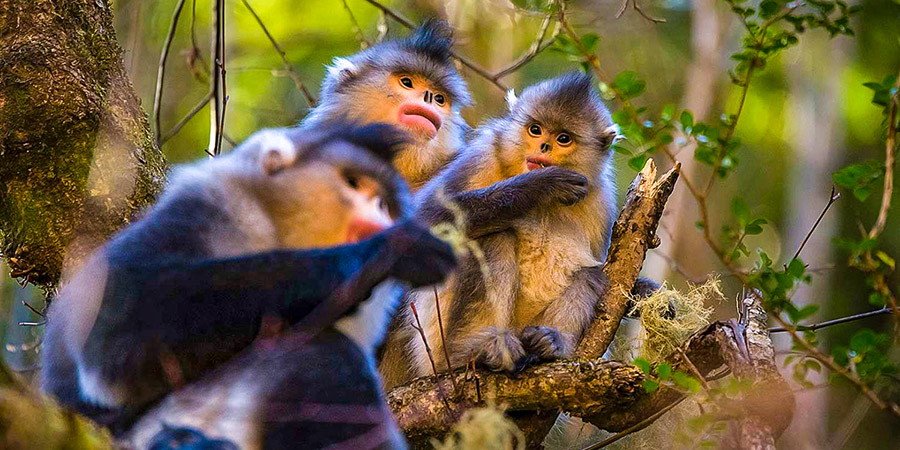 |
| Golden Monkeys in Laojun Mountain |
4. Alpine Lakes & Pools
On the northeast side of the Laojun Mountain, there are dozens of large and small glacial lakes and swamps at an altitude around 3,800 meters (12,467 feet). Distributed in clusters along the streams, they are called the 99 Dragon Pools. Here you’ll hike across many single-plank bridges and hear the sound of the rippling water, which is clear and cold from the melting snow in spring and the rain in summer.
Laojun Mountain Touring Route
Laojun Mountain has a variety of scenic trails that are perfect for hiking. Stretching up and down for hundreds of miles, the Mountain is divided into four areas: Liming Alpine Danxia Area, 99 Dragon Pools, Geladan Alpine Meadow, and Jinsichang Area. The main peak towers up to 4,515 meters (14,813 feet) in the central Jinsichang Area. So, if you have enough time and like camping, spend 2 to 3 days to relax in the mountain. Most tourists choose to visit the main scenic area of Laojun Mountain in one day, following the below route.
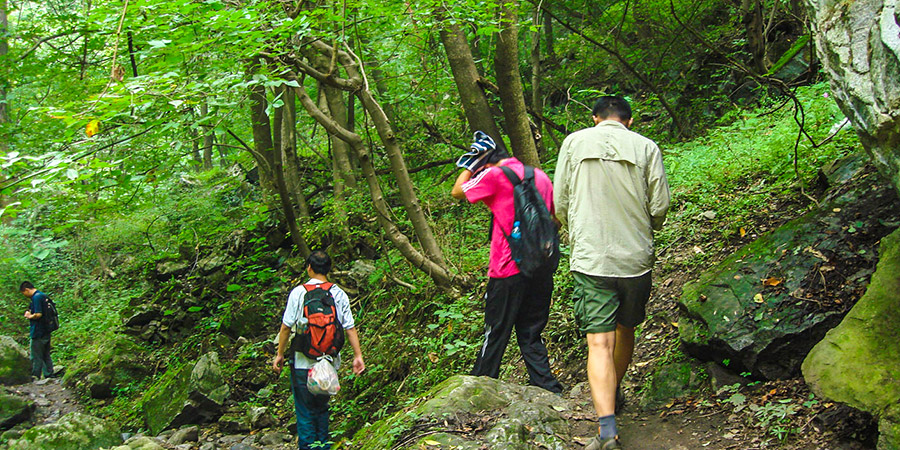 |
| Hikers on Laojun Mountain |
Lingguan Palace → Statue of Lao Tzu → Lincu Palace → Middle Heavenly Gate → Tree-lined Footpath → Woyun Pine → Bodhisattva Palace → Laojun Temple → Golden Summit → Yuhuang Summit
Brief Tour Plan

11:00: Arrive at Laojun Mountain from Lijiang

11:00 – 16:00: Laojun Mountain Hiking Tour

16:00 – 19:00: Get Back to Lijiang
Tips on Hiking Laojun Mountain

1. Take cableway to save energy
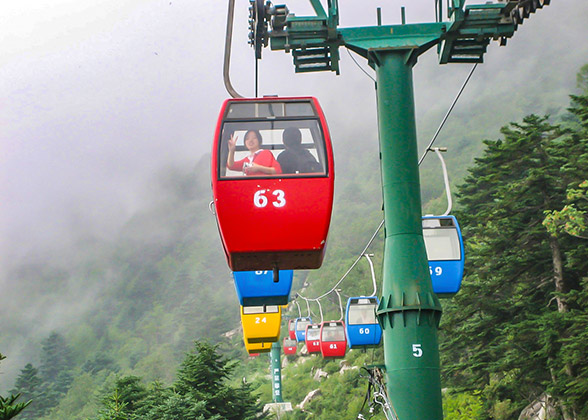 |
| Laojun Mountain Cableway |
You can walk all the way, or take the cableway to save time and energy. The Zhongling Cableway runs from the Lingguan Palace at the mountain foot to the Middle Heavenly Gate on the hillside. After getting off from the cable car, you can hike about one hour up to Yuhuang Summit on the top of the mountain. Remember to prepare some packed food for lunch.

2. Unstable mobile phone signal
It should be noted that the mobile phone signal is not very stable here. In addition, it is possible that there would be no signal after leaving the villages.
Best Months to Visit Laojun Mountain
May & June
Recommended Time for a Visit
Half to one day
Opening Hours
9:00 – 17:30
Ticket Price
CNY 70
How to get to Laojun Mountain from Lijiang
1. From Lijiang Old Town to Laojun Mountain
Laojun Mountain Special Bus Line 208 is recommended. Every day there is one bus departing from Yulong Coach Station at 6:30, passing by Lijiang Old Town at 8:00 and returning from Laojun Mountain at 16:30. The bus can also pick up tourists from Shuhe Ancient Town in the morning.

Distance: 120 km (75 mi)

Duration: 3 hours

Ticket: CNY 30 for a single trip.
You can go to the Laojun Mountain National Park Tourist Information Center outside the north gate of the Lijiang Old Town to book the bus tickets.
2. Another choice – From Jinkai Square to Laojun Mountain
A minibus runs from Jinkai Square of Lijiang to Laojun Mountain. It departs at 13:00 and arrives in 3.5 hours. A single-trip ticket costs CNY 35. The minibus returns from Liming Primary School at 7:30 the next morning. If you plan to stay overnight in Laojun Mountain, you can choose this bus to get back to Lijiang, and it is highly recommended that you get off at Shigu Old Town in the midway to have a 2-hour tour.
Get Back to Lijiang
When you finish the 4 to 5 hours’ hiking in the mountain, remember to get back to the bus station on time. The Special Bus Line 208 returns at 16:30.
There is also a minivan operated by the local villagers, running to Lijiang but with an unfixed schedule. You need to consult on the spot. A single trip from Laojun Mountain to Lijiang takes 3 to 3.5 hours and costs CNY 40
- Last updated on Nov. 21, 2024 by Zoey Gong -
 11:00: Arrive at Laojun Mountain from Lijiang
11:00: Arrive at Laojun Mountain from Lijiang 11:00 – 16:00: Laojun Mountain Hiking Tour
11:00 – 16:00: Laojun Mountain Hiking Tour 16:00 – 19:00: Get Back to Lijiang
16:00 – 19:00: Get Back to Lijiang 1. Take cableway to save energy
1. Take cableway to save energy 2. Unstable mobile phone signal
2. Unstable mobile phone signal Distance: 120 km (75 mi)
Distance: 120 km (75 mi) Duration: 3 hours
Duration: 3 hours Ticket: CNY 30 for a single trip.
Ticket: CNY 30 for a single trip.



